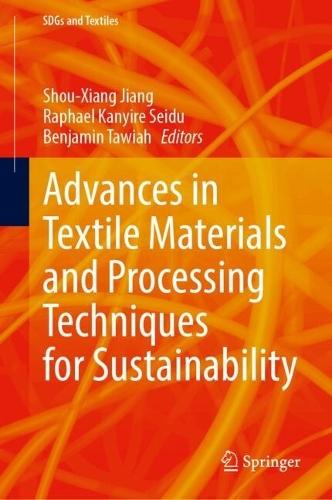Overview
This book addresses the essential need for innovative materials and processing techniques in manufacturing, making it a vital resource in the increasingly critical era of sustainable production. Globally, as industries face mounting pressure to reduce their environmental and social impact, this book comes in handy as it discusses the latest innovations in materials highlighting the important role of eco-friendly biodegradable textile materials revolutions and sustainable dye developments; and examines cutting-edge processing techniques that enhance the sustainability of textile production. Techniques such as waterless dyeing, energy-efficient manufacturing processes, and the integration of smart technologies for resource management are explored in detail. Other themes focusing on natural fibres from renewable resources, recycled materials, and recent innovations in fibre technology that contribute to sustainability will be discussed. Lifecycle assessment of textile materials and processing techniques evaluating the environmental impact of textiles from production to disposal has been discussed in detail with case studies illustrating the potential for large-scale adoption. The regulatory and certification regimes for sustainable textiles have been discussed extensively considering the unique challenges of the various economic blocs. The books conclude with a thorough discussion of the perception and acceptance of sustainable textiles by consumers. The multidisciplinary approach of this book - incorporating evidence from materials science, textile engineering, environmental science, and social perspective provides a holistic discourse on sustainability, making it suitable for ESG professionals, Environmental Science, Textile Science and Engineering, as well as Material Science students of all levels.
Full Product Details
Author: Shou-Xiang Jiang ,
Raphael Kanyire Seidu ,
Benjamin Tawiah
Publisher: Springer
Imprint: Springer
ISBN: 9789819504688
ISBN 10: 9819504686
Pages: 496
Publication Date: 05 October 2025
Audience:
Professional and scholarly
,
Professional & Vocational
Format: Hardback
Publisher's Status: Forthcoming
Availability: Not yet available

This item is yet to be released. You can pre-order this item and we will dispatch it to you upon its release.
Author Information
Shouxiang Jiang is a Professor of fashion and textiles at The Hong Kong Polytechnic University. He teaches a broad range of subjects such as innovative textile design approaches, advanced textile and fashion, and international fashion and textiles design. Prof. Jiang’s research deals with innovative textile effects using physical and chemical treatment technologies. He is internationally renowned for his development of the metallised textiles. Leading a team that has developed a sputtering coating technology with research funding from the HKSAR government and sponsorships from the textile industries, Prof. Kinor Jiang has designed and launched an anhydrous system that uses metallising technologies to produce functional and decorative textiles for the production line. He holds 30 granted and filed patents based on the coating technology. Prof. Jiang has published more than 200 journal papers and more than 10 books. His designs and art projects have been exhibited worldwide and received more than 30 awards. Raphael Kanyire Seidu (PhD) is a Research Assistant in the School of Fashion and Textiles (SFT) at The Hong Kong Polytechnic University, Hong Kong. He holds a PhD in Fashion and Textiles Design from The Hong Kong Polytechnic University, Hong Kong. He was a Visiting Research Student at Nottingham Trent University (NTU) in the UK. He was also awarded the 2024 School of Fashion and Textiles (SFT) Outstanding Research Achievement Award in the fashion category at The Hong Kong Polytechnic University, Hong Kong. He has several publications in leading journals in textile, design, technology, and material science. His recent paper was adjudged the “Second-Best Paper” presented at the 12th Sustainable Education and Development Research Conference in Somanya, Ghana. His research interest focuses on retro-reflective materials, smart textiles, cloth culture, weaving, and print technologies. Dr. Benjamin Tawiah is a lecturer in the Textiles and Fashion Section in the Department of Industrial Art, Kwame Nkrumah University of Science and Technology. He obtained his Ph.D. in Textile and Clothing Technology from the Hong Kong Polytechnic University. He then worked as a Postdoctoral Fellow at the Hong Kong Polytechnic University and the City University of Hong Kong. He is currently a Visiting Scholar at the Hong Kong Polytechnic University. He has published over 70 journal articles with 12 book chapters and co-edited a book titled “Nanotechnology in Societal Development” published by Springer in 2024. His research interests are in the areas of inkjet formulation, sustainable colouration, textile materials processing, nanofillers, nanocomposites, flame-retardant polymer composites, and second-generation batteries for energy storage.




